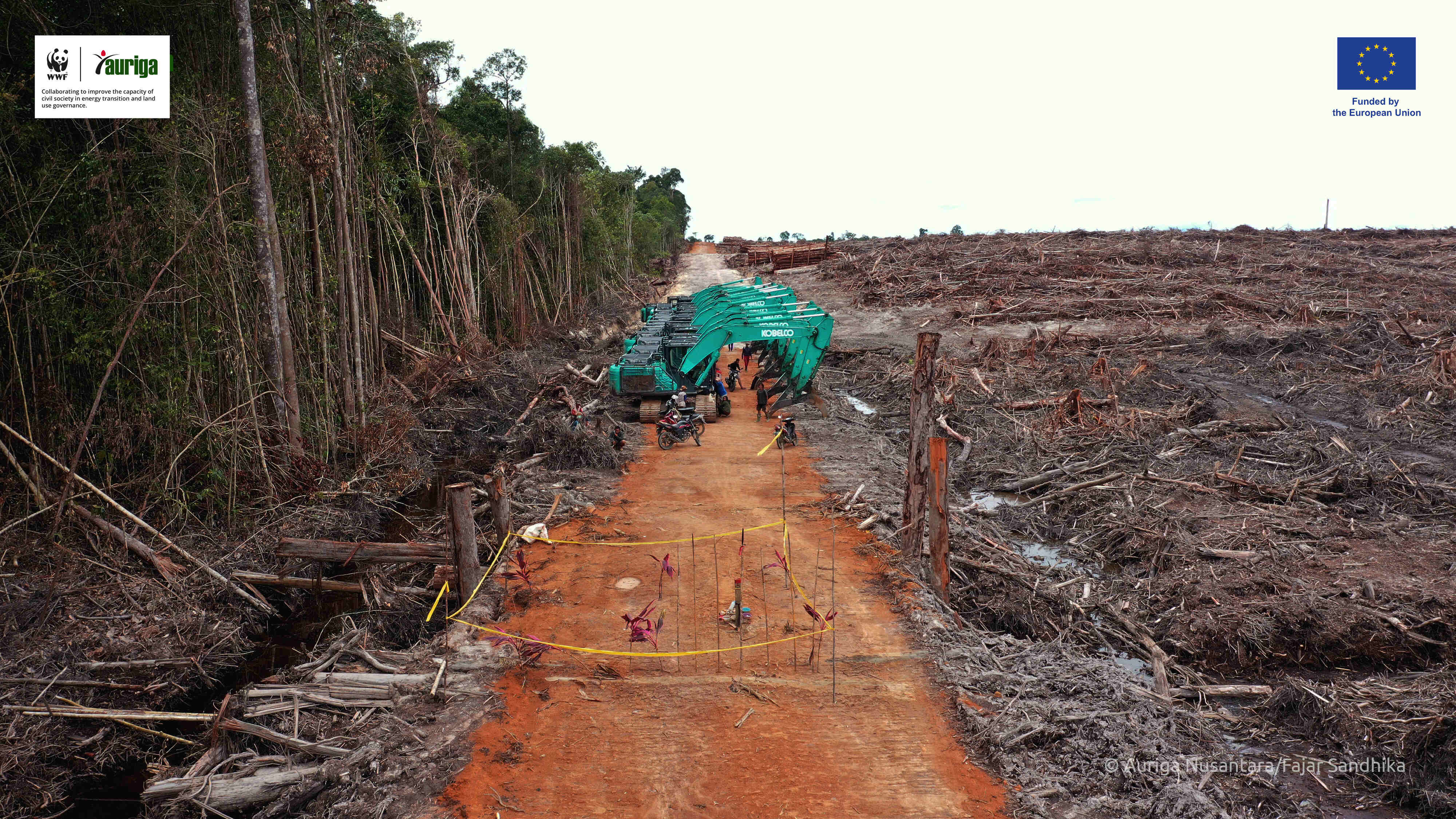Over the past two decades, Indonesia has claimed to be a model country for reducing deforestation through various national policies and international support. However, this success is starting to show signs of decline. The latest data from Auriga Nusantara through Simontini.id shows that the area of deforestation in Indonesia in 2023 reached 257,000 hectares and grew to 261,000 hectares the following year. This increase is a signal of pressure on Indonesia's forests, both from the expansion of extractive industries and from land clearing for large-scale plantations.
Central Kalimantan and Jambi are two of the ten provinces with the highest deforestation rates. Each of them has deforestation rates of 33,389 hectares and 14,839 hectares, respectively. Although deforestation is concentrated on the islands of Kalimantan and Sumatra, the geographical extent of deforestation is now spreading, including to eastern Indonesia such as Sulawesi. Central Sulawesi and Southeast Sulawesi have emerged as the two provinces with the highest deforestation rates, driven primarily by the expansion of nickel mining.
Patterns and Causes of Deforestation: Regional Context Specific
Deforestation that occurred in each region has different characteristics:
- Jambi is under intense pressure from the exploitation of forestry businesses, including industrial timber plantations and natural forest concessions, as well as oil palm plantations. Deforestation in Jambi has not only triggered changes in the ecological landscape but has also led to agrarian conflicts between companies and customary communities or smallholders.
- Central Kalimantan is facing multiple pressures from the industrial forest (HTI), palm oil and coal mining sectors. All three contribute to the loss of natural forests, while worsening environmental quality, including but not limited to air quality pollution, river pollution, and flooding.
- In Central Sulawesi and Southeast Sulawesi, the nickel mining sector is a major contributor to deforestation. Since the surge in global demand for nickel as a raw material for electric vehicle batteries, pressure on forest cover in Sulawesi has increased significantly. In the three main nickel-producing provinces of Sulawesi (including South Sulawesi), 4,200 hectares of deforestation has occurred in mining concessions spread across 210 points.
The impact of deforestation: Beyond forest cover loss
Over the years, public discourse on deforestation has often focused on the statistical numbers of forest area lost, without taking into account the multiplier effects caused by the loss of forest ecosystems. Forests are not just aggregates of trees-they are complex life support systems that sustain biodiversity, provide environmental services, and provide living and cultural spaces for millions of local and customary communities. In more detail, the multiplier effects that have at least occurred include:
- Social and Economic Impacts on Local Communities: Deforestation often comes hand-in-hand with the displacement of customary or local communities from the territories they have lived and managed for generations. Large-scale industrial developments, whether industrial timber plantations, palm oil, or mining, are generally not preceded by a process of Free, Prior and Informed Consent (FPIC). As a result, many communities lose access to the land, water sources and forests that support their lives. In addition to displacement, deforestation also exacerbates economic inequality. The work opportunities promised by companies are often temporary and inadequate, while the destruction of natural resources deprives communities of long-term livelihoods, such as non-timber forest products, local agriculture and inland fisheries.
- Wildlife extinction and habitat destruction: The forests in Jambi and Central Kalimantan are important habitats for a range of endemic and threatened species, including orangutans, Sumatran tigers and sun bears. Habitat fragmentation due to clear-cuts makes it difficult for these species to forage and breed, increasing their risk of extinction in the long term. In Sulawesi, deforestation due to nickel mining has affected species such as the anoa, babirusa and maleo bird, all of which are endemic to Sulawesi. Unfortunately, attention to biodiversity in mining areas is still limited, as the main focus is on the economic value of mining.
- Environmental Damage: Loss of forest cover increases the region's vulnerability to ecological disasters, such as floods, landslides and droughts. In Central Kalimantan, mining and plantation activities often cause river pollution due to chemical runoff, sedimentation and industrial waste. This has a direct impact on communities who depend on rivers for clean water, irrigation and fisheries. Meanwhile, in the coastal areas of Southeast Sulawesi and Central Sulawesi, nickel mining waste also has an impact on marine quality, reducing the health of coral reefs and triggering a decrease in fishermen's catches. Moreover, air pollution from land burning and open-pit mining has also affected the health of the surrounding communities.
- Social Conflict and Structural Violence: The massive investment in forested areas without adequate consultation mechanisms often leads to agrarian conflicts, whether between communities and companies, between community groups, or even between communities and state officials. In many cases, communities who fight for land rights are criminalized or face violence. These conflicts not only affect social stability, but also weaken the capacity of communities to manage resources sustainably. This situation makes deforestation-affected areas highly socially vulnerable, especially for women, children and other marginalized groups.
In this context, local civil society organizations (CSOs) play a strategic role as independent monitors and alternative sources of information amidst the lack of transparency from industry and government. Local CSOs have in-depth contextual knowledge of their territories, socio-economic relations, and the history of conflicts and power over land.
Therefore, through "Enabling Civil Society's contribution to Prosperous, Fair and Sustainable Development in Energy Transition and Sustainable Land Use" Project, Auriga Nusantara together with WWF with the support from the European Union seeks to support local civil society organizations to play a significant role in monitoring and documenting the deforestation impacts and threat posed by natural resources extraction. The focus will be not only on industrial expansion, but also on the impacts of land use change, particularly related to coal and nickel mining, oil palm plantation expansion and timber plantations. It is important to understand how these changes affect the environment and social lives of customary peoples and local communities.
The purpose of the Financial Support on Third Party (FTSP) on this opportunity is multifaceted, not only aiming to provide financial support, but also strengthening the role of civil society and local communities through evidence-based monitoring of land use change and energy transition. This opportunity is also to support civil society organizations in several important areas such as:
- Deforestation impact and threat posed by palm oil, pulpwood, and coal mining expansion in Central Kalimantan
- Deforestation impact and threat posed by timber forest plantation including pulpwood expansion and biomass plantation in Jambi
- Deforestation impact and threat posed by nickel mining in Central Sulawesi and Southeast Sulawesi
GENERAL REQUIREMENTS
This FSTP program has a dedicated focus on local areas with a high threat of land use change due to the expansion of nickel and coal mining, oil palm plantations and timber plantations. CSO applicants must be based in four provinces prioritized by Auriga Nusantara and WWF-Indonesia: Jambi, Central Kalimantan, Southeast Sulawesi, and/or Central Sulawesi. In addition, other conditions that must be complied with include the following:
- Have legal status in Indonesia
- The entity is a Civil Society Organizations, such as Non-Government Organizations (NGOs), Community-Based Organizations (CBOs), Research Organizations, or Research Groups of Universities.
- Have carried out activities related to the Just Energy Transition (JET) program and/or promoting land use management for at least two years.
- Not an institution affiliated with political interests
- Has good institutional governance, including finances, and can run its finances transparently.
- Applicant entity that have been involved in training on monitoring of land use change, palm oil and pulp supply chains, and mining held by WWF Indonesia and Auriga will be prioritized.
PROPOSAL ASSESSMENT
Apart from the requirements above, WWF-Indonesia & Auriga will also carry out an assessment based on:
- Experience in collaborating with multi - stakeholders.
- Have experience in monitoring natural resource governance including its relation to the fulfillment of the rights of local and indigenous communities.
- Experience in managing grant funds.
WWF-Indonesia & Auriga will announce the recipients of the grant funds to be funded for 6 months with the maximum amount IDR 200.000.000. It is estimated that the grant will start around late early August 2025.
The Call for Proposal process will go through the following steps:
- WWF Indonesia and Auriga will announce the Call for Proposal through our websites.
- The submission period is opened for prospective organization to send proposal based on the required criteria.
- WWF Indonesia and Auriga will assess and select the proposal based on the provided criteria.
- WWF Indonesia will conduct due diligence process to the selected partners.
- WWF Indonesia and Auriga will invite selected potential partners to discuss the proposal.
- After finalizing the proposal, subgrant recipient will receive final announcement and be invited to contracting process.
TIMELINE
- July 28 - 31, 2025: Preparation of narrative proposals by the candidates.
- August 1, 2025: Deadline for submission of narrative proposals by candidates.
- August 4 - 7, 2025: Discussion with shortlisted candidates for clarification of the Narrative Proposal and due diligence process.
- August 8, 2025: Announcement of grantees.
PROPOSAL STRUCTURE (MAX 15 PAGES)
- Project Title and Location
- Partner profile
- Background of the problem
- Project Goals, Objectives & Strategy
- Activities, expected results & timeline
- Structure of the implementation team
- Budget details (Staff, Operations, Activities)
Proposal templates are here: narative dan budget.
PROPOSAL SUBMISSION
Full Proposal can be sent to email address: hilman@auriga.or.id with and copy/cc to: info@auriga.or.id dan Ari Moch, Arif (arif@wwf.id)

